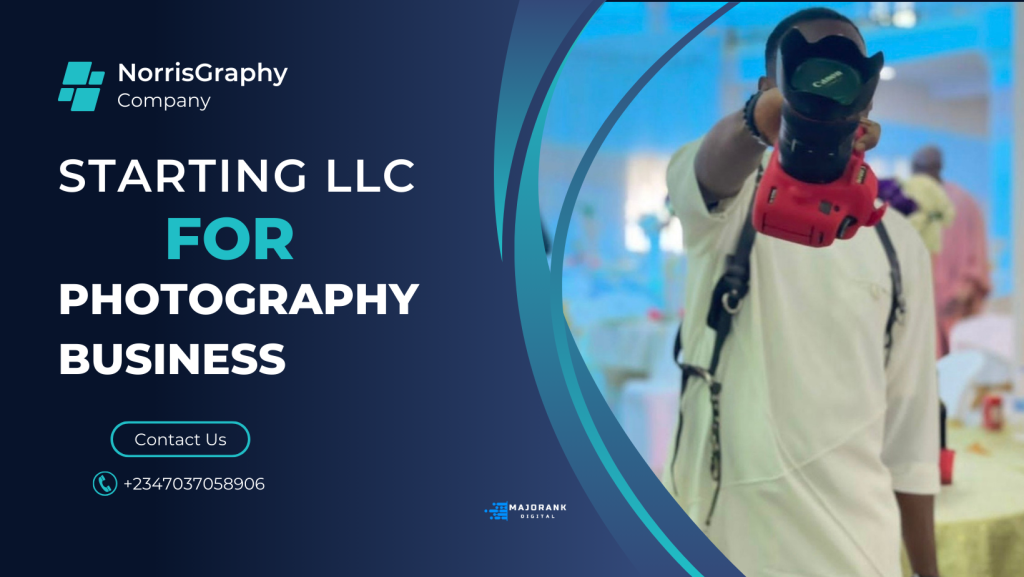
Starting a photography business allows you to turn your passion into a profitable venture. Whether you’re focusing on portraits, events, commercial photography, or fine art, forming a Limited Liability Company (LLC) is a smart move to protect your personal assets and establish a credible business structure. An LLC can offer benefits such as personal liability protection, tax advantages, and operational flexibility. In this guide, we’ll go through the detailed steps to form an LLC for your photography business.
What is an LLC?
A Limited Liability Company (LLC) is a legal structure that combines the limited liability protection of a corporation with the flexibility and simplicity of a sole proprietorship or partnership. By forming an LLC, you separate your personal assets from your business liabilities, meaning that if your photography business faces legal issues or debts, your personal property such as your home, car, or personal savings is generally protected. LLCs are also pass-through entities, meaning the business’s profits and losses are reported on your personal tax return. source
Why Choose LLC for Photography Business?
- Personal Liability Protection: As a photographer, you may face risks related to property damage, copyright infringement, or client dissatisfaction. An LLC provides a layer of personal protection, shielding your assets from potential business liabilities.
- Tax Advantages: LLCs offer pass-through taxation, meaning the business itself does not pay federal income taxes. Instead, profits are passed to the owner(s) and reported on their personal tax returns, potentially simplifying your tax obligations.
- Credibility and Professionalism: Forming an LLC adds professionalism to your photography business. It shows clients that you’re a legitimate business, which can help you secure more contracts, especially with corporate or commercial clients.
- Flexibility for Business Growth: If you plan to expand your photography services, bring in partners, or hire employees, an LLC provides the legal and operational flexibility to support growth without complex restructuring.
Also read about – HOW TO START LLC FOR CONSULTING BUSINESS
Steps to Form LLC for Your Photography Business
1. Choose Your LLC Name
Your LLC name should reflect your photography brand and be unique in your state. It must include “LLC” or “Limited Liability Company.” Consider a name that is memorable, easy to spell, and represents your photography niche. Before finalizing your name, check its availability in your state’s business registry and verify that it’s available as a domain name for your website. A strong, cohesive brand name across all platforms will enhance your online presence and help attract clients.
2. Appoint a Registered Agent
A registered agent is a person or service designated to receive important legal documents and official correspondence on behalf of your LLC. Every state requires LLCs to have a registered agent who has a physical address in the state where the LLC is formed.
Here’s a closer look at the role and importance of appointing a registered agent for your photography business:
- Legal Responsibilities: A registered agent ensures your LLC complies with state regulations by accepting service of process (legal notices, including lawsuits) and government documents like tax forms. Without a registered agent, you risk missing critical legal or compliance notifications, which could result in penalties or legal issues.
- Privacy Protection: If you’re operating your photography business from home, listing your personal address as your business address can expose it to public records. By appointing a third-party registered agent, you can maintain privacy and protect your personal address from being publicly associated with your business.
- Availability: The registered agent must be available during normal business hours to receive documents. As a photographer, your schedule may involve offsite shoots, travel, or irregular working hours, making it difficult for you to always be available to accept important documents. Having a registered agent ensures that someone is always present to handle these responsibilities. A highly reputable registered agent service is Northwest Registered Agent, which offers:
- Data Privacy: Northwest is known for its strong commitment to privacy and data protection, ensuring that your personal information is not sold or misused.
- Compliance Reminders: Northwest helps keep your LLC in good standing by sending reminders for important filings, such as annual reports or tax deadlines.
- Document Scanning: Northwest scans all legal documents they receive for your LLC and uploads them to your secure online account, providing easy access.
- National Service: If you decide to expand your photography business into multiple states, Northwest Registered Agent can represent your LLC in those states as well.
- Top-Tier Customer Support: Their customer service team is known for being knowledgeable and responsive, helping with questions related to forming and maintaining your LLC.
Using a professional registered agent service like Northwest Registered Agent can help ensure your photography business stays compliant and that important documents are handled promptly and securely.
3. File Articles of Organization
To officially form your LLC, you must file Articles of Organization with your state’s Secretary of State or equivalent office. This document includes essential information such as:
- Your LLC’s name
- Your business address
- The name and address of your registered agent
- The names of the LLC members (if applicable)
You’ll also need to pay a state-specific filing fee, which typically ranges from $50 to $500 depending on where you are forming your LLC. Once filed and approved, your LLC is officially recognized by the state.
4. Create an Operating Agreement
An operating agreement outlines the ownership and management structure of your LLC. It details the roles and responsibilities of the members, how profits and losses will be distributed, and procedures for resolving disputes. While not required in all states, it is highly recommended for LLCs, even if you’re a single-member LLC. For your photography business, an operating agreement can clarify the separation between your personal and business assets, especially if you’re considering future business growth, partnerships, or investors.
5. Obtain an EIN (Employer Identification Number)
An Employer Identification Number (EIN) is a unique identifier for your LLC, used for tax purposes. You will need an EIN to open a business bank account, hire employees, and file taxes. It’s easy to obtain an EIN for free through the IRS website.
6. Register for State Taxes and Obtain Any Necessary Permits
Depending on your state, you may need to register for certain state taxes, such as sales tax if you sell physical products like photo prints, albums, or other photography-related merchandise. Additionally, you may need business licenses or permits depending on your location. Be sure to check with your local and state government offices to ensure you’re compliant with all business regulations.
7. Open a Business Bank Account
Opening a business bank account is essential for keeping your personal and business finances separate. Use your LLC’s EIN to open the account, which will simplify managing your business expenses, tracking income, and preparing for tax season. It also helps maintain the liability protection that your LLC offers.
8. Get Business Insurance
Although an LLC protects your personal assets, it doesn’t cover all business risks. Consider the following types of insurance for your photography business:
- General Liability Insurance: Protects against claims of bodily injury or property damage that could arise during a photoshoot or at your studio.
- Professional Liability Insurance: Also known as errors and omissions insurance, this protects you from claims related to mistakes, missed deadlines, or unsatisfactory work.
- Equipment Insurance: As a photographer, your camera and lighting equipment are essential to your business. Equipment insurance protects your gear from theft, damage, or loss.
Maintaining Your LLC
Once your LLC is formed, you must comply with ongoing state requirements to keep it in good standing. This may include filing annual reports, paying required fees, and maintaining a registered agent. Failure to comply with these requirements can lead to penalties or dissolution of your LLC.
Conclusion
Forming an LLC for your photography business provides numerous benefits, including liability protection, tax advantages, and increased credibility. By following these steps and considering services like Northwest Registered Agent, you can ensure that your photography business is legally compliant and positioned for success.
Be sure to consult with a legal or financial professional if you have specific questions during the process. With the right legal foundation, your photography business can grow and thrive with confidence.






